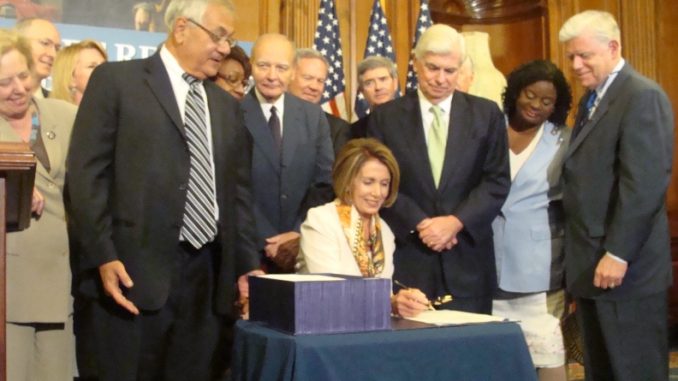
I don’t think they mean to do it. But they don’t do anything about it, either.The left, whose adherents love to talk about “fairness” and “speaking truth to power,” continually pursue excessive regulations that act as barriers to anything that challenges the power of both governmental and private-sector institutions. Consumers, along with small-and medium-sized businesses, are the most hurt.Take finance in particular the 2010 Dodd-Frank law, sweeping regulations passed after the financial crisis. Opinions on whether Dodd-Frank hurt community banks range from “definitely” to “almost certainly.” The data is staggering. From the enactment of Dodd-Frank until the fall of 2016, more than 1,700 American banks disappeared. Almost no new banks have been formed.Some people, including former Rep. Barney Frank himself, have insisted that other regulations have more to do with the crippling of community banks than did Dodd-Frank. In other words, We didn’t knock them down. We just administered the coup de grâce. Well, that’s a relief.How about health care? It’s no secret that Obamacare has run most insurers out of most markets. In the individual market, almost all of the Old North State is covered by one insurer only now, the giant Blue Cross and Blue Shield of N.C.And how is BCBSNC doing? It survived Obamacare when the others didn’t. Many North Carolinians probably assume that BCBSNC had a terrible year last year, when a butcher’s bill of problems culminated in a record $3.6 million fine from the N.C. Department of Insurance. But it survived. After a loss of $50 million in 2014 and basically a break-even year in 2015, for 2016 the nonprofit posted a profit oops, net income of $185 million.It’s good to be the big dog. But it’s especially good to be the only dog.Even just the threat of future regulation can accelerate the drive to immensity. The consolidation of big businesses into giant businesses usually happens for one of two reasons. The first is a shrinking market that upsets longstanding business models. Current examples include the consolidations in the cable TV industry and in the macro-brewing industry.The second reason is uncertainty about the future of a business model, which includes the threat of an increased regulatory burden. Electric generation and delivery is an example. For most of the history of the electric power industry, the monopolistic, highly capital-intensive utilities would place very expensive assets into service and recoup their investment, along with a steady profit, over 40, 60, or even 80 years. But as states began to dilute the “least-cost” model of generation by requiring more expensive generation sources with shorter (or unknown) longevity, utility consolidation increased. And when the threat of regulations on carbon dioxide became very real, the consolidation of the industry increased further. Big fish merge into giant whales, all the better to withstand the regulatory harpoons when the boats are circling above.Even industries run exclusively by the left have had to admit the burdens of government regulation. Whatever their position on abortion, conservatives and libertarians rightly reveled in the concession that abortion providers and their allies made when states including North Carolina and Texas ramped up regulations on the clinics. It will cripple us and you know it, the clinics lamented.But even if they will admit that the burden is real, modern progressives (and some conservatives) are far too enamored of control to fix the problem. Every attempt to loosen the red tape is met with hysteria and a portrayal that it was that exact regulation that was keeping everything from unravelling. And of course, it doesn’t matter at all to progressives what the effects of a policy are, only the intentions. Who can pinpoint, after all, what were the exact causes of the death for those community banks, regional utilities, or health insurers?So consumers lose, and the big guys win. Again, and again. Drew Elliot is a member of the North State Journal’s editorial board, separate from the news staff. Unlike other newspapers, the North State Journal does not publish unsigned editorials; the author or authors of every editorial, letter, op-ed, and column is prominently displayed. To submit a letter or op-ed, see our submission guidelines.



